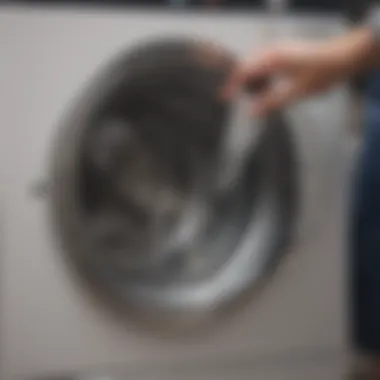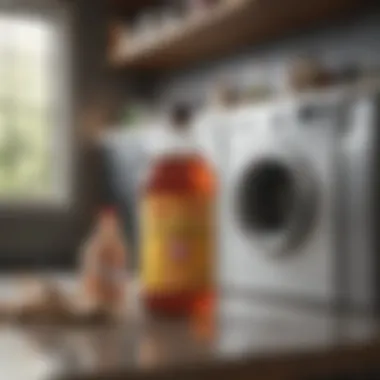Cleaning Your Washer with Vinegar: A Complete Guide


Intro
Cleaning household appliances often gets overlooked in routine maintenance. One appliance that deserves special attention is the washing machine. Many people might not realize the potential benefits of using vinegar as a cleaning agent. Vinegar is not only an effective cleaner, but it is also inexpensive and eco-friendly. This guide delves into the specifics of using vinegar for cleaning washers, covering processes, safety, and environmental impacts.
The intention is to provide a thorough examination of how vinegar can enhance the performance of washing machines. By exploring its effectiveness and offering practical tips, homeowners can maintain their washers better and ensure longevity.
Understanding the Effectiveness of Vinegar
Vinegar possesses natural antibacterial and antifungal properties. These attributes make it suitable for cleaning various surfaces, including washing machines. When used correctly, vinegar helps eliminate residue build-up and odors caused by mold and mildew. The acetic acid in vinegar acts as a powerful cleanser, breaking down grime and detergent residues efficiently.
Some key points on why vinegar is effective include:
- Disinfection: Vinegar can kill certain bacteria and mold spores.
- Odor Neutralization: It helps to eliminate unpleasant smells, leaving the washer smelling fresh.
- Residue Removal: It breaks down soap scum and detergent residues, ensuring a clean drum.
Cleaning Process with Vinegar
To clean your washer using vinegar, follow these steps:
- Preparation: Gather materials such as white vinegar and a soft cloth.
- Empty the Washer: Ensure that the washer drum is empty before starting the cleaning process.
- Add Vinegar: Pour two cups of white vinegar into the detergent dispenser or directly into the drum.
- Run a Cycle: Start a hot water cycle. This helps the vinegar circulate and clean the washer effectively.
- Wipe Down: After the cycle, use a soft cloth to wipe down the drum, door, and detergent compartments.
- Follow-Up Query: If necessary, consider running an additional rinse cycle to remove any remaining vinegar.
This process should be done monthly to maintain optimal washing conditions.
Practical Tips for Maintaining a Clean Washer
To ensure your washing machine stays clean, consider these additional tips:
- Regularly check and clean the lint filter.
- Leave the washer door open after each use to allow for air circulation.
- Clean the detergent drawer every few weeks to prevent build-up.
- Occasionally check hoses for blockages and wear.
Benefits and Drawbacks of Using Vinegar
"Vinegar is a versatile tool in household cleaning. Its value cannot be underestimated."
While vinegar presents numerous benefits, it is also important to consider potential drawbacks. Some advantages are:
- It is non-toxic and eco-friendly.
- Inexpensive compared to commercial cleaners.
On the other hand, drawbacks might include:
- The strong odor some individuals may find unpleasant.
- Not suitable for all materials; vinegar can damage rubber gaskets and certain types of seals over time.
Safety Considerations
When using vinegar, consider the following safety practices:
- Always dilute vinegar, especially when using it near sensitive components.
- Avoid mixing vinegar with bleach, as it creates harmful fumes.
Environmental Impacts
Using vinegar is an environmentally friendly option compared to harsher chemical cleaners. It decomposes naturally, leaving little to no harmful residues in the ecosystem.
Overall, incorporating vinegar into your washer cleaning routine is an efficient way to maintain a clean machine without resorting to synthetic chemicals.
By understanding how to effectively use vinegar, homeowners can enhance their appliance's longevity and efficiency, contributing to a fresher home environment.
Preface to Washer Maintenance
Washer maintenance is often overlooked, yet it plays a crucial role in the longevity and efficiency of this appliance. Regular care not only extends the life of a washing machine but also ensures optimal performance. A clean washer can handle loads better, prevent unpleasant odors, and safeguard your clothes from dirt and residues.


Importance of Regular Cleaning
The need for regular cleaning of your washer cannot be overstated. Over time, detergent build-up, fabric softener residue, and dirt can accumulate inside the machine. This may result in inefficient washing cycles and unpleasent smells. Regularly cleaning the washer keeps its internal components functional and well-maintained. It also helps in eliminating mold and mildew, common problems that arise in the damp environments of washing machines.
Moreover, a clean washer contributes to cleaner laundry. Clothes washed in a dirty machine can come out stained or smelling less than fresh. Therefore, incorporating routine cleaning as part of your washer maintenance strategy is vital for maintaining fabric quality and hygiene. This simple step can make a significant difference in both the washer’s performance and the overall laundry experience.
Common Issues Faced by Washing Machines
Various issues can arise if washing machines are not maintained properly. Some of the most common problems include:
- Odors: A foul smell from the washer usually indicates mold growth or stagnant water, both of which can be addressed with regular cleaning.
- Discoloration: Clothes may become discolored if residual detergent or fabric softener is not cleaned out regularly.
- Blockages: Lint and detergent build-up can clog pipes and filters, leading to longer cycle times or even mechanical failures.
- Inefficiency: As dirt accumulates, washing machines may work harder to achieve the same cleaning results, leading to higher energy and water usage.
By staying aware of these common issues, users can take preventative actions through regular maintenance and cleaning, including the use of vinegar as an effective cleaning agent.
The Role of Vinegar in Cleaning
Cleaning washing machines may seem trivial, but many people overlook its significance in maintaining their appliances. The role of vinegar is paramount in this context. Vinegar's unique properties can combat common build-up and odors associated with washing machines. Understanding how vinegar works to clean and deodorize your washer can empower you to take better care of your appliance.
What Makes Vinegar Effective
Vinegar is primarily acetic acid, which gives it significant cleaning power. The acidity can break down mineral deposits, soap scum, and grime that accumulate in washers over time. Here are several factors that contribute to vinegar's effectiveness:
- Acidic Nature: The pH level is low, allowing for natural breakdown of deposits.
- Antimicrobial Properties: Vinegar can reduce bacteria and mold, which thrive in damp environments like washing machines.
- Odor Neutralizer: It effectively removes unpleasant smells, leaving your washer fresh and clean.
These attributes make vinegar a powerful yet gentle cleaner. It is less likely to damage washer parts compared to harsher chemicals.
Comparing Vinegar to Other Cleaners
When evaluating cleaning agents for your washing machine, vinegar stands out against many commercial products. Here's how vinegar compares:
- Environmental Impact: Vinegar is biodegradable and less harmful to the environment than many synthetic cleaners.
- Cost: A bottle of vinegar is generally much cheaper than branded cleaning solutions. This cost-effectiveness is particularly appealing to homeowners.
- Availability: Vinegar is easily accessible at grocery stores, making it a convenient choice.
Despite its advantages, vinegar may not be suitable for all cleaning situations. Some specialized products are formulated for specific issues, such as tackling rust or deep stains on certain materials. Nevertheless, for routine maintenance, vinegar is often sufficient.
"Using vinegar as a primary cleaning agent for your washer not only saves money but also promotes an eco-friendly approach to household cleaning."
How to Use Vinegar to Clean Your Washer
Cleaning your washer regularly is crucial for maintaining its performance and prolonging its lifespan. Using vinegar is a simple and effective method that can help eliminate odors, residue, and buildup that often accumulate in washing machines over time. This section will walk you through how to prepare your washer, choose the right type of vinegar, run a vinegar cycle, and perform post-cleaning steps. Each of these points is vital to ensure optimal results when cleaning your appliance.
Step-by-Step Cleaning Process
Preparing Your Washer
Before engaging in the cleaning task, preparing your washer is a fundamental step. This involves emptying the washer of any laundry, ensuring that the drum is completely free of clothes and other items. This step is essential because any lingering items might interfere with the cleaning cycle. A clean slate ensures that the vinegar can work directly on the buildup without obstruction.
One key characteristic of this preparation phase is its ability to maximize the effectiveness of the cleaning solution. Without this clear space, any residue or buildup may not be adequately addressed by the vinegar. Therefore, taking the time to prepare properly is not only beneficial but necessary for a thorough wash.
Choosing the Right Vinegar
Selecting the correct type of vinegar is equally significant. White distilled vinegar is the most recommended option for cleaning your washer. Its acidic nature is effective at breaking down soap scum and mineral deposits without leaving odors behind. Furthermore, unlike other types of vinegar, such as apple cider vinegar, white vinegar does not leave any residue that could possibly affect future loads of laundry.
The unique feature of white vinegar is its mild acidity, which allows for effective cleaning while being safe for most washing machines. This reduces the risk of damage, making it a popular choice among homeowners looking to maintain their appliances safely.
Running a Vinegar Cycle
To clean your washer using vinegar, you will need to run a vinegar cycle. Start by pouring two cups of white vinegar into the drum. Then, select a hot water cycle, as the heat helps activate the cleaning properties of the vinegar. Running this cycle effectively allows the vinegar to circulate throughout the machine, penetrating areas where limescale and buildup may have accumulated.
The primary advantage of this method is that it reaches areas that are often hard to clean, like the draining system and rubber gaskets. This thorough cleansing action is beneficial as it not only addresses odors but also helps in reducing potential mechanical issues caused by buildup.


Post-Cleaning Steps
Drying the Washer
Once the vinegar cycle is complete, it is essential to dry your washer adequately. The drying process involves leaving the door open for a few hours to allow air circulation inside. This is important because it prevents mold and mildew from developing due to moisture trapped within. An open washer will dry more effectively, ensuring a fresher environment for your next load of laundry.
One key characteristic of this step is its contribution to overall cleanliness. By allowing your washer to dry completely, you mitigate the risk of unpleasant odors and maintain a hygienic environment. This practice is a beneficial choice for anyone regularly using their washing machine.
Inspecting for Residue
After the drying process, inspecting your washer for any lingering residue is advised. Checking the drum and the seals for any signs of buildup ensures that the vinegar cycle was effective. This step is not only a good preventative measure but also contributes to the machine's longevity.
The unique feature of this inspection is its preventive nature. By identifying any remaining residue, you can address it immediately, thus avoiding larger issues in the future. It empowers users to keep a closer eye on their appliance's health and ensures that their cleaning regimen remains effective.
Frequency of Cleaning
Regular cleaning of your washing machine is essential to ensure its optimal performance and longevity. Many users overlook this crucial step, assuming that washing clothes alone is sufficient to maintain the machine's cleanliness. However, like any other appliance, washing machines accumulate residue, mold, and mineral build-up over time, which can affect their efficiency. Establishing a consistent cleaning routine helps to prevent unpleasant odors and ensures clean clothes after every wash.
How Often Should You Clean
The frequency with which you clean your washer can depend on several factors:
- Usage: If you use your washing machine daily, you might need to clean it once a month.
- Type of Laundry: If you often wash heavily soiled items, a more frequent cleaning schedule would be wise.
- Water Quality: Hard water can cause mineral buildup faster than softer water. If you live in an area with hard water, consider cleaning your washer every two to four weeks.
A general recommendation is to clean your washer at least every one to three months. This routine will help maintain freshness and reduce the risk of bacterial growth and musty smells, keeping your clothes smelling clean.
Signs Your Washer Needs Cleaning
It’s not only about the scheduled cleaning. There are specific signs indicating that your washer is overdue for a cleaning session. Look for these:
- Odors: A persistent foul odor can indicate mold and mildew.
- Residue: Noticeable soap or dirt residue inside the drum or on the door gasket can signal build-up.
- Clogged Filters: If you're experiencing longer wash times, it might be due to clogged filters, which need to be cleaned out.
- Stains on Clothes: If freshly washed laundry comes out with stains or unpleasant smells, the washer might be the source.
Regular attention to your washer not only ensures cleanliness but also enhances its life span, thus preventing more costly repairs or replacements.
By addressing both the routine and warning signs proactively, you maintain a washing machine that functions effectively and keeps your clothing in pristine condition.
Benefits of Using Vinegar
Cleaning your washer with vinegar presents myriad advantages. These benefits encompass safety, environmental impact, and cost-effectiveness. Understanding these points is crucial for homeowners aiming to maintain their appliances in an efficient and responsible manner.
Safety and Environmental Considerations
Vinegar is a natural cleaning agent. It contains acetic acid, which is effective against bacteria, mold, and other harmful microbes. This property makes it a safer alternative to many commercial cleaners, which may contain harmful chemicals. For individuals concerned about the detrimental effects of such substances on their health and the environment, vinegar offers a reassuring solution.
Moreover, vinegar is biodegradable. Its use in cleaning minimizes environmental impact compared to synthetic cleaners that often contribute to pollution and hazardous waste. In addition, vinegar does not leave behind toxic residues, making it ideal for homes with pets or children.
- Key Points:
- Natural antibacterial properties.
- Biodegradable and non-toxic.
- Safe for homes with children and pets.
"Using vinegar as a cleaner not only ensures a safe environment but also aligns with sustainable practices that protect our planet."
Cost-Effectiveness
Using vinegar for cleaning is cost-effective. A standard bottle of vinegar is generally inexpensive compared to specialized cleaning products. This accessibility makes it an attractive option for many households seeking to save on cleaning expenses.
In practical terms, a single bottle of vinegar can serve multiple cleaning functions, not just for the washer. This multipurpose utility translates into significant savings over time. Additionally, the reduced need for purchasing various cleaning products means fewer plastic containers entering landfills.
Consumers can enjoy the dual benefits of cutting costs while also contributing to reducing their environmental footprint.
- Advantages:


- Low cost compared to traditional cleaners.
- Multi-use application beyond the washing machine.
- Long-term savings with reduced shopping frequency.
In summary, the benefits of using vinegar in washer maintenance are considerable. From safety and environmental impacts to cost-effectiveness, vinegar stands out as not only an efficient cleaner but also a responsible choice. Homeowners should consider these aspects when choosing cleaning methods for their appliances.
Potential Drawbacks of Vinegar
When discussing the use of vinegar as a cleaning agent for washing machines, it is crucial to address the potential drawbacks. While vinegar boasts many cleaning properties and environmental benefits, it is not without its limitations. Understanding these drawbacks can help users make informed decisions about their maintenance practices. This section will delve into the acidity of vinegar and its compatibility with various types of washers. By examining these points, readers can better assess whether vinegar is suitable for their specific needs.
Acidity and Its Effects on Machines
Vinegar is well-known for its acidic properties, primarily due to the acetic acid it contains. This acidity can dissolve mineral deposits and grime effectively. However, it raises concerns about its impact on washer components. Prolonged use of vinegar can potentially harm seals, hoses, and the inner drum, especially if they are made from materials sensitive to acid. It is essential to note that while occasional use may not cause immediate issues, frequent exposure can lead to a gradual breakdown of these parts.
Here are some key points regarding vinegar's acidity impacts:
- Seal and Gasket Degradation: Rubber gaskets and seals can wear out faster when exposed regularly to vinegar's acid. Users should inspect these components routinely to ensure longevity.
- Corrosion Risk: Metal parts within the washer may rust or corrode over time. It is advisable to limit the frequency with which vinegar is used if a washer has noticeable metal parts.
- pH Balancing: In certain situations, prolonged vinegar use may disturb the washer's internal pH balance, possibly affecting subsequent washes.
Thus, while vinegar can serve as a potent cleaner, caution should be exercised to minimize any detrimental effects on the machine's integrity.
Compatibility with Different Washer Types
Washer designs vary significantly, and each type has unique requirements. As a result, vinegar may not be universally compatible. Here are important considerations to remember:
- Top-Load vs. Front-Load Washers: Front-load washers typically feature rubber seals that are more vulnerable to acidic cleaners. Users are urged to consult their manufacturer’s guidelines before introducing vinegar into their cleaning regimen.
- High-Efficiency Models: High-efficiency washers often require specialized detergents, and vinegar may interfere with this efficiency. Disregarding the manufacturer's instructions can potentially void warranties or affect the machine's cleaning performance.
- Old Models: Older washers might be more susceptible to vinegar's effects due to aging materials. Users should confirm whether vinegar is suitable for their specific model by referring to the owner’s manual.
Additional Tips for Washer Care
Maintaining your washing machine goes beyond mere cleaning; it encompasses a series of practices that ensure your appliance operates efficiently and has a long lifespan. The additional tips presented in this section are vital in enhancing the overall functionality of your washer. It is often the small details that make significant differences. Implementing these practices can lead to cleaner laundry, a more efficient machine, and potentially fewer repairs over time.
Using Baking Soda in Conjunction with Vinegar
Baking soda is a powerful companion to vinegar in the quest for a clean washer. While vinegar excels in breaking down mineral deposits and removing odors, baking soda shines at absorbing additional odors and neutralizing acids. Combining these two ingredients creates a powerful duo that tackles scaling and residue accumulation effectively.
To use baking soda, simply add half a cup to the washing drum along with a quart of vinegar. Run a hot water cycle, and the results can be remarkable. Besides enhancing cleaning efficiency, this combination may also contribute to maintaining a more balanced pH in the machine. This is important because exceedingly high or low pH levels can harm the internal components of your washer.
Benefits of Using Baking Soda with Vinegar:
- Enhances odor removal
- Fights stubborn stains
- Maintains a balanced pH
- Reduces the risk of residue build-up
Maintaining Your Washer's Gasket and Seal
The gasket and seal of your washer are often overlooked but play a crucial role in preventing leaks and maintaining proper function. The gasket, usually made from rubber, can harbor mold, mildew, and detergent residues, especially in front-loading washers. Not only do these buildups cause unpleasant odors, but they can also compromise the seal's integrity over time.
Regular inspection and cleaning of this area should be part of your maintenance routine. Wipe the gasket with a cloth dampened with a vinegar solution. This simple action can eliminate residues and prevent the growth of mold. Pay attention to the folds and crevices, where gunk might accumulate unnoticed.
Key Points for Gasket Maintenance:
- Regularly inspect for mold and residues
- Clean with a vinegar solution to remove build-up
- Dry the gasket after use to prevent moisture accumulation
Maintaining the washer's gasket and seal can prevent larger issues down the line and ensure that your washing experience remains effective and satisfying. All these practices contribute to not just cleaner clothes but also a well-functioning appliance.
Finale
Cleaning your washing machine is often overlooked, yet it plays a significant role in maintaining its efficiency and prolonging its life. This article has delved into the benefits of using vinegar as a cleaning agent, providing a thorough understanding of its effectiveness and practicality in washer maintenance. Homeowners can achieve a cleaner machine without relying solely on commercial products, which can be more expensive and contain harsh chemicals.
Recap of Key Points
- Effectiveness of Vinegar: Vinegar is a natural disinfectant that helps in removing dirt, mold, and unpleasant odors from the washer. Its acidic nature aids in breaking down residue, improving the cleaning efficiency of the appliance.
- Cleaning Process: The step-by-step guide on how to use vinegar helps ensure a proper cleaning cycle. Preparing the washer, choosing the correct type of vinegar, and understanding the complete cleaning cycle are crucial for optimal results.
- Additional Considerations: We explored the synergy between vinegar and other natural cleaners, like baking soda. Furthermore, regular inspection of the washer’s gasket and seals contributes to overall appliance longevity.
- Benefits vs. Drawbacks: The article has balanced the benefits of vinegar with its potential drawbacks, such as its acidity affecting certain washer components. Understanding these factors allows homeowners to make an informed decision about washer cleaning methods.
Final Thoughts
In summary, maintaining a clean washing machine is vital for its performance and your clothing's cleanliness. Using vinegar presents a viable, economical, and environmentally friendly alternatives to conventional cleaners. By incorporating vinegar into your cleaning routine, you take a proactive approach to washer care. Remember, regular maintenance combined with the right cleaning agents not only extends the lifespan of your appliance but also ensures effective cleaning cycles. Embrace the simplicity and effectiveness of this natural cleaner to nurture your washing machine, supporting its operation for years to come.
"Cleaning your washing machine can lead to fresher clothes and a more efficient appliance."
Whether you are a seasoned cleaning pro or new to washer maintenance, these insights are designed to empower you to achieve optimal results.















